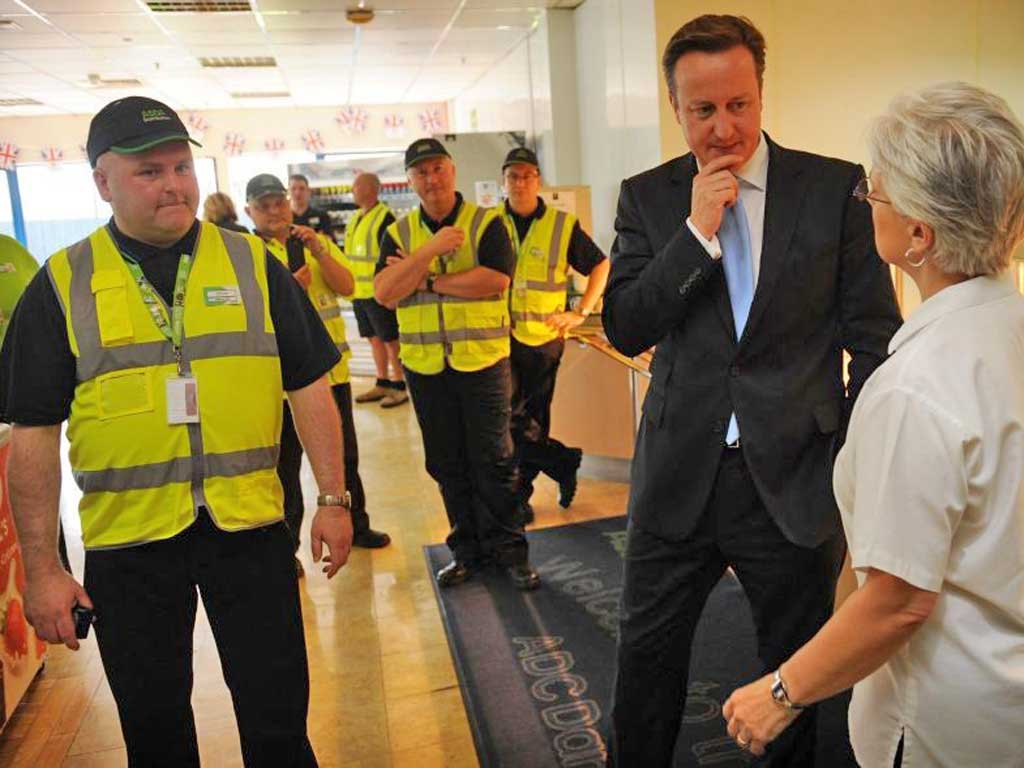Conservatives raise the spectre of food vouchers for the poor
Cameron hints at paying benefits 'in kind' but drops any mention of regional welfare levels

A future Conservative Government would consider handing out some state benefits "in kind" rather than in cash, David Cameron said yesterday, raising the spectre of food vouchers for the poor.
In a highly provocative speech, the Prime Minister also suggested breaking the link between benefits and inflation and reducing the amount of money paid to people to cut the £84bn bill for working-age welfare.
But a proposal to introduce regional welfare levels – so that people in areas where pay is lower receive lower benefits – was removed from his speech at the last minute. Downing Street later insisted that the idea was still "open to debate".
In his speech, Mr Cameron made clear that he was not putting forward specific policy proposals and said he wanted to have "a real national debate and ask some fundamental, searching questions about working-age welfare". However, critics said his ideas were clearly skewed in favour of an unprecedented benefits crackdown and designed to appeal to voters who believe the welfare state is too generous.
"Financial help through the benefits system provides a vital lifeline for hundreds of thousands of children," said Matthew Reed, chief executive of the Children's Society. "Taking this away in yet further cuts to welfare would be a complete disaster for so many children up and down the country."
Mr Cameron said he wanted to end a "culture of entitlement" which saw some people living long-term on welfare with higher incomes than neighbours who worked. Among the ideas he floated was the withdrawal of housing benefit from under-25s, removing the right for high-earners to keep their council homes, a reduction in the £20,000-a-year cap on housing support and limits on the additional benefit received by families with three or more children. He also suggested it might be possible to curtail cash payments to those on welfare. "Is it right that we continue to pay the vast majority of welfare benefits in cash, rather than in benefits in kind, like free school meals?" he said.
However, a similar scheme brought in for asylum-seekers had to be dropped after evidence emerged that it stigmatised families.
Perhaps the most controversial section of the speech was briefed to reporters before Mr Cameron had spoken, and was then dropped from the final version. In it, Mr Cameron was to suggest introducing more regional flexibility into welfare payments because benefit levels affected incentives to work.
"Clearly wage rates vary around the country," a Downing Street spokesman said. "What someone receives in benefits compared to what they potentially get by going into a job has an impact on the incentives they face." Afterwards, he would not comment on why it had been removed, but said the Prime Minister wanted to have a broad debate on welfare.
Aware of polling which shows widespread support for a benefits crackdown, Labour did not condemn all aspects of Mr Cameron's proposals but pointed out that a plan to force those out of work to do community service had been brought in by the last government before being scrapped by the Coalition. Liam Byrne, the shadow Work and Pensions Secretary, said: "David Cameron has put worklessness to a record high and he's inviting us to believe that it's the fault of everyone except him. It's now very clear that a welfare revolution was all talk. Each week we hear of another new initiative, another crackdown, another test."
Helen Dent, chief executive of Family Action, said: "We are concerned about some of the proposals the Prime Minister floated in his speech.
"Safeguards should be in place so that children are not punished by Government for their parents' problems, and young people should not be penalised by changes to housing which could trap many vulnerable young people in unsuitable circumstances."
Join our commenting forum
Join thought-provoking conversations, follow other Independent readers and see their replies
Comments
Bookmark popover
Removed from bookmarks